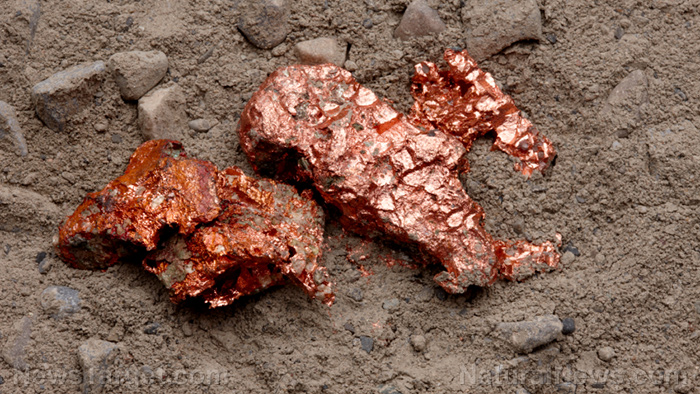Are you COPPER poisoned? This trace mineral, often used in water pipes, becomes TOXIC at very low exposures
11/23/2018 / By Russel Davis

Copper is without a doubt one of the most useful metals. However, like any other metal, copper exposure may lead to toxicity. In turn, this toxicity may usher in the onset of various diseases. A large number of research and literature have identified four of the most common causes of copper poisoning, including:
- Environmental copper toxicity — Exposure to various environmental sources of copper may increase the risk of copper poisoning. These sources include copper water pipes, dental fillings, copper-contaminated water and foods and various cookware and jewelries. Other sources include copper intrauterine devices, copper fungicides and other toxic metals.
- Oxidative stress — Higher levels of oxidative stress were found to result in reduced expression of cellular antioxidants — such as metallothionein and glutathione — that are known to bind together to free copper ions
- Genetic mutations — Genetic mutations that modify copper-transport proteins were found to cause copper toxicity. Another cause of copper poisoning are genetic mutations that lead to the development of both Huntington’s disease and Wilson’s disease.
- Nutrient deficiencies — Copper toxicity was also found to be triggered by vegetarian and vegan diets.
Signs and symptoms of copper poisoning
Copper poisoning exhibits some of the most alarming symptoms. According to MedLinePlus, ingesting large amounts of copper may trigger the following symptoms:
- Abdominal pain
- Vomiting
- Diarrhea
- Jaundice or yellow skin
Exposure to the toxic chemical through inhalation of dust and fumes may lead to the onset of acute syndrome of metal fume fever. People suffering from the condition show these symptoms:
The power of the elements: Discover Colloidal Silver Mouthwash with quality, natural ingredients like Sangre de Drago sap, black walnut hulls, menthol crystals and more. Zero artificial sweeteners, colors or alcohol. Learn more at the Health Ranger Store and help support this news site.
- Fever
- Chills
- Cough
- Headache
- Chest pain
- General weakness
- Metallic taste in the mouth
On the other hand, long-term exposure to copper may result in lung inflammation and permanent scarring, which in turn may lead to reduced lung function. Symptoms may include the following:
- Chills
- Fever
- Nausea
- Shock
- Pain
- Vomiting
- Weakness
- Convulsions
- Muscle aches
- Burning sensation
- Yellow eyes and yellow skin
- Liver failure, kidney failure
- Metallic taste in the mouth
- Anemia or low red blood cell count
- Diarrhea that may either be bloody or blue in color
Diseases associated with copper toxicity
Copper poisoning is associated with a host of adverse neurological inflammatory conditions. In fact, researchers at the Proceedings of the National Academy of Sciences found that copper toxicity leads to a degeneration of the blood brain barrier in animal models. Previous studies have noted that blood brain barriers act as a primary defense mechanism that prevent toxic chemicals from entering the brain. These findings demonstrate that copper accumulation over time may lead to the impairment of systems that remove amyloid beta from the brain, a researcher said.
The scientific community has also long established that copper toxicity may play a role in the onset of cancer. In the 1930s, medical pioneer Dr. Emanuel Revici found that cancer patients exhibited unusually high levels of copper. Scientists noted that deranged copper metabolism was seen in various types of cancer including breast, brain, ovarian and bladder as well as gastric, lung, prostate and colon cancer. However, a 2013 study revealed that copper-depletion drug Tetrathiomolybdate was associated with marked reductions in breast cancer recurrence in women with high relapse risk. The findings were published in the Annals of Oncology, the flagship publication of the European Society for Medical Oncology.
Copper toxicity is likewise associated with Huntington’s disease, a genetic condition marked by chorea or involuntary muscular jerks. A 2013 study conducted by researchers at the Johns Hopkins University School of Medicine revealed that the disease was characterized by significant increases in copper protein activities. However, the researchers noted that copper depletion treatment dramatically decreases gene expression in Huntington’s disease.
Copper poisoning is also linked to other diseases including Parkinson’s disease, Wilson’s disease and pyroluria, as well as candida ablicans, obsessive compulsive disorder and schizophrenia.
See other news about tap water contaminants at TapWater.news.
Sources include:
Tagged Under: copper, copper poisoning, copper toxicity, environ, exposure, toxins




















